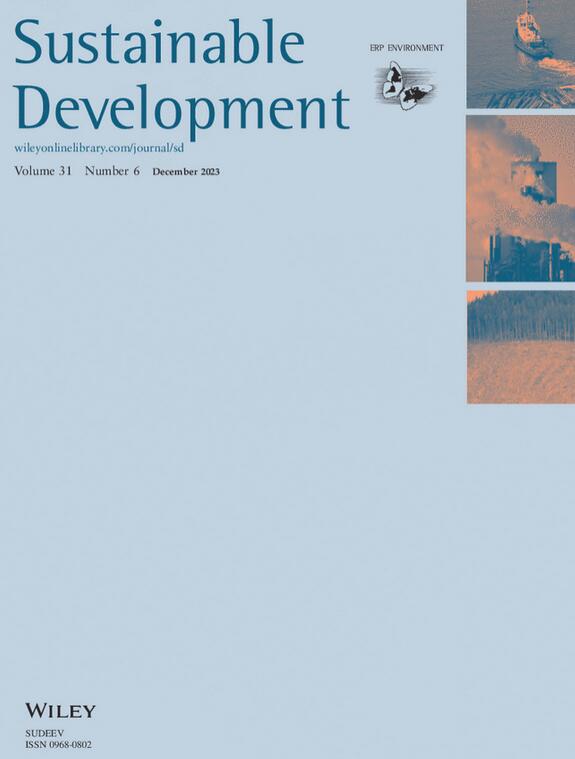Leveraging on the fourth industrial revolution by African accountants in the sustenance of SDGs and AU Agenda 2063
IF 9.9
1区 环境科学与生态学
Q1 DEVELOPMENT STUDIES
引用次数: 0
Abstract
The research sought to assess the use of 4IR technologies by the accountancy profession in Africa in the sustenance of SDGs and AU Agenda 2063. The investigation adopted a pragmatic approach, associated with mixed‐methodological approach. The target population for the study was 114,800 Professional Accountancy Organisations (PAOs) members from all 44 countries in Africa who were members of the Pan African Federation of Accountants (PAFA). Online questionnaires and telephone interviews were administered to gather data. A total of 267 responses were received out of 114,800 members representing 0.23% of the population. Forty‐eight accountants were interviewed by telephone using the snowball sampling technique. Quantitative data gathered from online questionnaires was analysed using the IBM Statistical Package for Social Sciences (SPSS) version 26 and ATLAS.ti 9 was used to analyse responses from interviews. The study showed that accountants in Africa had heard about 4IR technologies, with the Internet of Things (IoT) mostly used and known by accountants. The study established that 4IR technologies improved the standard of living, reduced social marginalisation, eased manual work, improved agricultural productivity, reduced environmental pollution, improved health services, financial inclusion and knowledge sharing. These benefits are critical for achieving SDGs and the African Agenda 2063. Accountants are recommended to continuously train and retrain on new and trending technologies like computerised audits, big data analytics, machine learning, artificial intelligence, robotics, bitcoin and its risks in the monetary systems, cyber security in the 4IR era, cloud computing and information management systems to sustain SDGs and AU Agenda 2063.非洲会计师利用第四次工业革命支持可持续发展目标和非盟 2063 年议程
本研究旨在评估非洲会计行业在支持可持续发展目标和非盟 2063 年议程方面使用 4IR 技术的情况。调查采用了与混合方法相关的实用方法。研究的目标人群是泛非会计师联合会(PAFA)所有 44 个非洲国家的 114800 名专业会计组织(PAOs)成员。通过在线问卷和电话访谈收集数据。在 114,800 名会员中,共收到 267 份答复,占总人口的 0.23%。采用滚雪球抽样技术,对 48 名会计师进行了电话访谈。从在线问卷中收集的定量数据使用 IBM 社会科学统计软件包 (SPSS) 26 版进行分析,访谈答复则使用 ATLAS.ti 9 进行分析。研究表明,非洲的会计师听说过 4IR 技术,其中物联网 (IoT) 被会计师广泛使用和了解。研究确定,4IR 技术提高了生活水平,减少了社会边缘化,减轻了体力劳动,提高了农业生产率,减少了环境污染,改善了医疗服务,实现了金融普惠和知识共享。这些益处对于实现可持续发展目标和非洲 2063 年议程至关重要。建议会计师不断接受有关新技术和趋势技术的培训和再培训,如计算机审计、大数据分析、机器学习、人工智能、机器人技术、比特币及其在货币体系中的风险、4IR 时代的网络安全、云计算和信息管理系统,以维持可持续发展目标和非盟 2063 议程。
本文章由计算机程序翻译,如有差异,请以英文原文为准。
求助全文
约1分钟内获得全文
求助全文
来源期刊

Sustainable Development
Multiple-
CiteScore
17.30
自引率
11.20%
发文量
168
期刊介绍:
Sustainable Development is a publication that takes an interdisciplinary approach to explore and propose strategies for achieving sustainable development. Our aim is to discuss and address the challenges associated with sustainable development and the Sustainable Development Goals. All submissions are subjected to a thorough review process to ensure that our readers receive valuable and original content of the highest caliber.
 求助内容:
求助内容: 应助结果提醒方式:
应助结果提醒方式:


